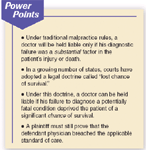Article
"Lost chance of survival": The new malpractice risk
This growing legal threat is a chilling development for primary care physicians.
Failure to diagnose." Those three words can be chilling to doctors who are charged with them. In fact, failure to diagnose has long been one of the leading causes of malpractice claims against primary care physicians-particularly in cases of cancer. But a growing legal threat raises the stakes, taking "failure to diagnose" several steps further and creating even greater liability for doctors.
Under traditional malpractice rules, a doctor will be held liable only if a jury finds that his diagnostic failure was a substantial factor in the patient's injury or death. In an increasing number of states, however, courts have adopted a controversial doctrine called "lost chance of survival." Under this doctrine, a doctor can be held liable if his failure to diagnose a potentially fatal condition deprived the patient of a significant chance of survival. To understand this principle, consider the following case now pending before the Kentucky Supreme Court:

In late April, Kemper ordered a CT scan of Gordon's abdomen, which revealed a 2 cm hemangioma on her liver, and a 2 cm ovarian cyst, both of which Kemper interpreted as being within normal limits. He did not order any upper GI studies.
Believing he had ruled out all possible physical causes for Gordon's symptoms, Kemper suggested that she needed psychiatric care rather than medical treatment. That summer, Gordon saw a psychiatrist who diagnosed an anxiety disorder and prescribed more medication. Through the summer and fall of 1996, she consulted several other therapists and another internist, most of whom confirmed the anxiety diagnosis.
Gordon insisted that her anxiety was the result of her constant nausea, not the cause of it, and she remained convinced that something was physically wrong. As her symptoms worsened, she was often so tired she could barely get out of bed, and so nauseated that she could hardly eat. Her weight dropped from 137 to 117 pounds.
In December 1996, Gordon discovered two enlarged lymph nodes in her neck and returned to the second internist. He ordered a biopsy which revealed an adenocarcinoma, later classified as Grade IV. Tests including a CT scan of her abdomen and pelvis led to a diagnosis of metastatic gastric cancer.
Gordon sued Kemper and several other physicians for malpractice in July 1997. She claimed that he had failed to make a timely diagnosis of her stomach cancer, thereby allowing it to progress in scope and severity. She died six months later, but her husband and children pursued the case. The other defendants eventually settled or were dismissed, and the case finally went to trial in 2002. Although some experts testified that Gordon's chances of survival would have been considerably better if Kemper had made the correct diagnosis earlier, the jury found him not liable for her death.
"Lost chance of survival": an emerging doctrine
During the trial, Gordon's family also argued that Kemper's failure to diagnose or treat her cancer had diminished her chance of survival-a different claim from whether his alleged negligence had actually "caused" her injury. Because the trial judge hadn't included that separate claim in his instructions to the jury, the Gordons appealed.





